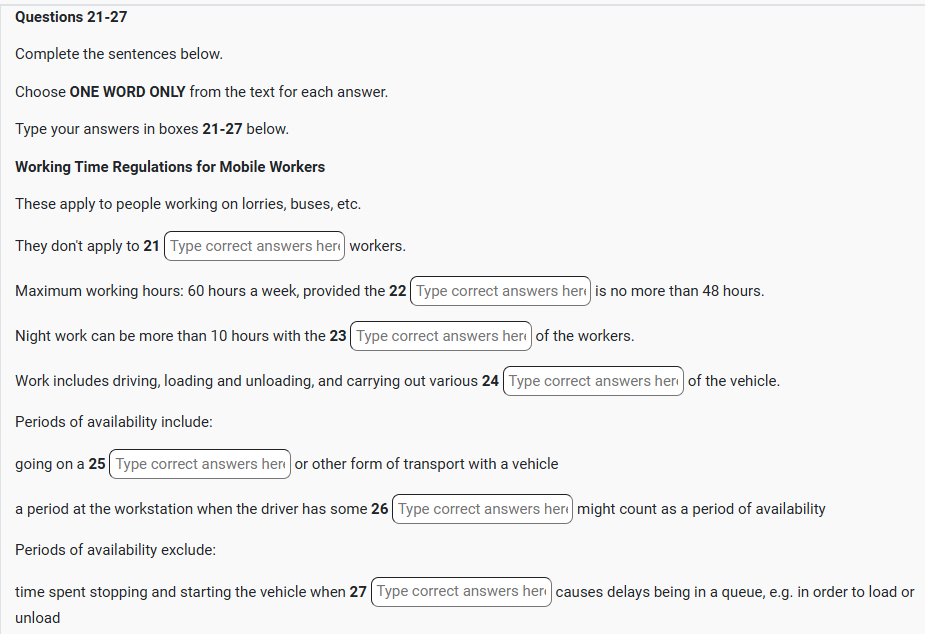

IELTS READING Working Time Regulations for Mobile Workers Reading Practice Test has 10 Questions belongs to the Law / Employment subject.. |
These rules apply to drivers and crew of heavy goods vehicles or public service vehicles. The rules limit the amount of time that can be worked.
Those defined in the Regulations as being self-employed are currently not covered by the Regulations.

What are the limits?
• An average of 48 hours’ work per week.
• In any single week up to 60 hours can be worked so long as the 48-hour average is maintained.
• Night work is limited to 10 hours per night, unless there is a workforce agreement to work longer.
• Statutory annual leave and any sick leave and/or maternity/paternity leave counts as working time.
What counts as work?
In general, any activities performed in connection with the transport operation count as work, for example, driving, loading/unloading and those checks that are the responsibility of drivers, such as checking lights, brakes, etc. There are a number of periods of time that do not count as work, for example, travelling between home and your normal place of work, lunch or other breaks and periods of availability.
Periods of availability are periods of time during which the mobile worker is not required to remain at their workstation but is required to be available for work, the foreseeable duration of which is known about in advance, for example:
• Delays at a distribution centre.
• Reporting for work then being informed that no duties are to be undertaken for a specified period.
• Accompanying a vehicle being transported, for example by train.
A period of availability can be taken at the workstation. Providing the worker has a reasonable amount of freedom (e.g. they can read and relax) for a known duration, this could satisfy the requirements of a period of availability.
Situations when a period of time should not be recorded as a period of availability:
• Hold-ups due to congestion, because the driver would be stopping and starting the vehicle.
• Frequently moving up within a queue (e.g. waiting within a queue to load or unload) every other minute.
Easily Get Required Score I am interested in IELTS Pass with Confidence, Dehradun Small Batch Size with Flexible Time, professional faculty.
8439000086
8439000087
7055710003
7055710004
IELTS Simulation 323 GMS Road, Near Ballupur Chowk, Dehradun, India
![]()
email: info at ieltsband7.com
Boost Your Score: Practice IELTS Online with IELTS Simulator Prepare for IELTS Effectively Using IELTS Simulator Ace the IELTS: Try Realistic Practice on IELTS Simulator IELTS Simulator: Online Practice to Improve Your IELTS Score Rocky Bay field trip listening practice test has 10 questions belongs to the Leisure & Entertainment subject. Prepare for IELTS IELTS Test International Experienced Teacher Best Training By CELTA Trainer. Best Results Easily Get Required Score IELTS Exam Dates Available, Small Batch Size with Flexible Time, Professional. Easily Get Required Score I am interested in IELTS Pass with Confidence, Dehradun Small Batch Size with Flexible Time, professional faculty. Learn From Experienced Teacher Best IELTS Coaching Dehradun Best IELTS in Dehradun Uttarakhand GMS Road BEST coaching in Dehradun Apply for Class Courses Today Good Results. Small Batch Size, Flexible Time and Professional IELTS Teacher Best IELTS coaching classes IDP certified British Council trained and CELTA certified experienced trainer. Easily Get Required Score Tel:8439000086 Tel:8439000087 Tel:7055710003 Tel:7055710004 Tel:7055710009